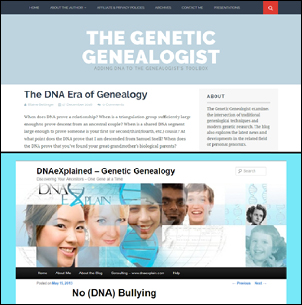A look at DNA through other eyes
This Sunday blog is where The Legal Genealogist shares thoughts about using the cool tool of DNA in genealogical research.
This year, for example, I’ve shared my thoughts about those ethnicity percentages, and why you can’t simply assume that a result of — oh — 25% Irish means you have one Irish grandparent.1 And we’ve looked at the entry of MyHeritage into the DNA field, with its responsiveness to the community’s concerns on privacy issues.2 We’ve considered the changed in the matching system at Family Tree DNA,3 And why DNA isn’t a magic bullet.4
Today, it’s where I want to share the thoughts of others.
Two absolute must-read posts by other genetic genealogy bloggers.
 One of them is brand-new: a post just yesterday by Blaine T. Bettinger at The Genetic Genealogist called “The DNA Era of Genealogy”.5
One of them is brand-new: a post just yesterday by Blaine T. Bettinger at The Genetic Genealogist called “The DNA Era of Genealogy”.5
In this critically-important post, Blaine asks the key question we all need to ask about DNA and its use in genealogical research: “When does DNA prove a relationship?” And he offers an answer that may surprise you: “NEVER.” And, he goes on, “this is, perhaps, one of the greatest misconceptions in the post-DNA era of genealogy.”6
His key conclusion: “Whether the DNA evidence supports (versus proves!) a hypothesis or conclusion is an entirely different question, and is the one that should be asked.”7
This is seriously important stuff — and a must-read post.
The other is a post from some time ago — but the points it makes are timeless. It was published in 2013 by Roberta Estes at DNAeXplained–Genetic Genealogy, and it’s called “No (DNA) Bullying.”8
In this critically-important post, Roberta highlights the risk that overly enthusiastic researchers — and I’ve certainly been in that category more than once myself — can all-to-easily cross the line between encouraging family members to take DNA tests and share their results with us and bullying them into doing do.
She points out that “Bullying is unwelcome aggressive behavior that involves repeated threats, physical or electronic contact or a real or perceived imbalance of power. Generally, the victim feels they can’t make it stop. This has become especially prevalent in the cyber age. And bullying is not just about kids.”9
And, she emphasizes, “genetic genealogy is about genealogy. It’s a hobby. It’s fun. If it becomes otherwise and puts people at jeopardy, then we need to take a step back and take a deep breath.”10
Must-reads for this DNA Sunday — DNA through the eyes of others.
SOURCES
- See Judy G. Russell, “Those percentages, revisited,” The Legal Genealogist, posted 1 May 2016 (https://www.legalgenealogist.com/blog : accessed 17 Dec 2016). ↩
- Ibid., “MyHeritage DNA matching & terms of use,” posted 22 May 2016, and “MyHeritage DNA terms changed,” posted 27 May 2016. ↩
- Ibid., “FTDNA changes matching system,” posted 24 May 2016, and “Family Tree DNA changes: a work in progress”, posted 10 July 2016. ↩
- Ibid., “No magic bullet”, posted 19 Oct 2016. ↩
- Blaine T. Bettinger, “The DNA Era of Genealogy,” The Genetic Genealogist, posted 17 Dec 2016 (http://thegeneticgenealogist.com/ : accessed 17 Dec 2016). ↩
- Ibid. ↩
- Ibid. ↩
- Roberta Estes, “No (DNA) Bullying,” DNAeXplained–Genetic Genealogy, posted 15 May 2013 (https://dna-explained.com/ : accessed 17 Dec 2016). ↩
- Ibid. ↩
- Ibid. ↩



I had my DNA done through Ancestry. Having traced nearly all my ancestors back to either France (1500s), Sweden (1600s) and Armenia (1850), I fail to see how Ancestry says 60% British Isles, 1% African, and 0% Middle Eastern. No one has yet come up with a logical explanation for any of this. I just feel I wasted $99 for the test.
Ethnicity estimation is the single weakest part of DNA testing — and I’ve written about this repeatedly. The GOOD reason for DNA testing is to connect with cousins with whom you can work collaboratively on your genealogy. The percentages below the continental level are little better than cocktail party conversation pieces.
Blaine Bettinger’s article is especially good. Thanks for calling it to our attention.
Blaine’s blog is well worth following. Just sayin’ … 🙂
I remember a story on the BakerDNA site one time about one of the Baker’s who had his paper trail but just wanted the DNA to back it up. Surprise! DNA “supported” evidence he was of “Wetzel” lineage proving DNA an essential tool.